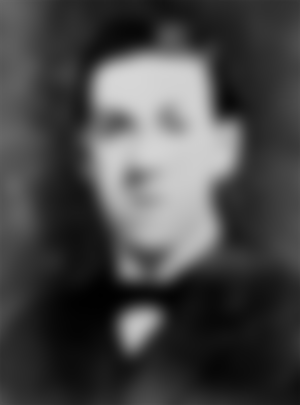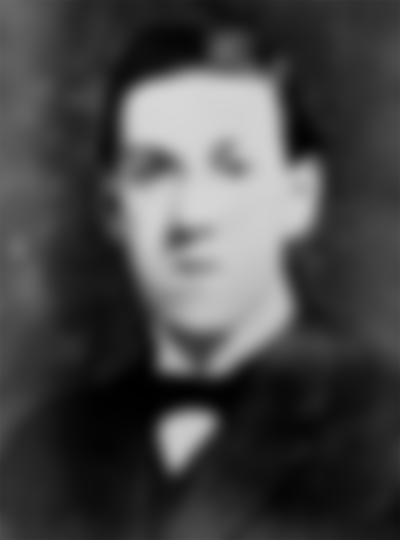Howard Phillips Lovecraft (1890-1937) was a very influential author. He is known as one of the first to write “horror” stories, but he is much more than that. His writings have not only influenced literature and film, but philosophy as well. And his Cthulhu Mythos are in a class of their own. Lovecraft is famous, but despite his fame, in my opinion grossly underestimated. Amongst common people, at least outside the English-speaking world, less famous than Edgar Allan Poe, he was not less macabre or less influential. Horror, religious magic, forbidden knowledge, inherited guilt, superstition, and threats from science were some of his themes. His influence can be found in modern horror literature, fantasy, science fiction, anime and manga, and much more.
Lovecraft builds on the “gothic” horror tradition, represented by for instance Poe (whose influence on Lovecraft is striking), but he evolves it to something more and different. The gothic horror story affirms the supernatural, while Lovecraft in a sense is very material. That is one thing that makes his writings so suggestive and credible. This special style is sometimes called Lovecraftian.
(Below: H.P. Lovecraft in 1915. Photo taken for the Amateur Publishing Association. [In the Public Domain])

A characteristic of the Lovecraftian is “cosmicism”. It is a sense that "that which man was not meant to know" is very close to ordinary life, still alien and possibly dangerous even to contemplate about. If nothing else, such contemplation would lead to insanity. However, the word, Lovecraftian, has also come to be used about anything resembling something in Lovecraft's production.
H.P. Lovecraft did not gain financially from his writing, not more than marginally; he lacked the ability to promote himself, and remained a man of very modest means all through his life. Stories were published in obscure magazines with small readership. As for so many other authors and artists, his work didn't catch general interest until after his death. However, he did influence a group of his contemporaries, with which he was in regular communication. One of them was Robert E. Howard, the author of Conan the Barbarian; others were, for instance, Robert Bloch and Fritz Leiber. It is quite clear that “Lovecraftianism” reached into the works of this group of authors. And posterity is in huge debt to this genius; he has inspired numerous authors, film-makers and other creative artists. Stephen King writes in "Dance Macabre" that Lovecraft was the major reason for him to take an interest in horror.
In my opinion, it is wrong to see Lovecraft simply as a writer of horror. He is something more than just a writer of horror stories. On a deeper level, he deals with philosophy, psychology and cosmology.
Lovecraft's most important work is the creation of the so-called Cthulhu Mythos. An important part of this mythology is The Great Old Ones, unfathomable cosmic deities from space, presently resting in a deathlike slumber.
Other authors also came to write about the Lovecraftian universe of the Cthulhu Mythos. One of the best of them was Robert Bloch (American author, 1917-1994).
"The most merciful thing in the world, I think, is the inability of the human mind to correlate all its contents. We live on a placid island of ignorance in the midst of black seas of infinity, and it was not meant that we should voyage far. The sciences, each straining in its own direction, have hitherto harmed us little; but some day the piecing together of dissociated knowledge will open up such terrifying vistas of reality, and of our frightful position therein, that we shall either go mad from the revelation or flee from the light into the peace and safety of a new dark age."
(H.P. Lovecraft, The Call of Cthulhu, 1926)
“Now all my tales are based on the fundamental premise that common human laws and interests and emotions have no validity or significance in the vast cosmos-at-large. To me there is nothing but puerility in a tale in which the human form - and the local human passions and conditions and standards - are depicted as native to other worlds or other universes. To achieve the essence of real externality, whether of time or space or dimension, one must forget that such things as organic life, good and evil, love and hate, and all such local attributes of a negligible and temporary race called mankind, have any existence at all. Only the human scenes and characters must have human qualities. These must be handled with unsparing realism, (not catch-penny romanticism) but when we cross the line to the boundless and hideous unknown - the shadow-haunted Outside - we must remember to leave our humanity and terrestrialism at the threshold.”
(H.P. Lovecraft, in note to the editor of Weird Tales, on resubmission of "The Call of Cthulhu”)
“What do we know [...] of the world and the universe about us? Our means of receiving impressions are absurdly few, and our notions of surrounding objects infinitely narrow. We see things only as we are constructed to see them, and can gain no idea of their absolute nature. With five feeble senses we pretend to comprehend the boundlessly complex cosmos, yet other beings with wider, stronger, or different range of senses might not only see very differently the things we see, but might see and study whole worlds of matter, energy, and life which lie close at hand yet can never be detected with the senses we have.”
(H.P. Lovecraft, "From Beyond" - published June 1934 in The Fantasy Fan)
“It is only the inferior thinker who hastens to explain the singular and the complex by the primitive shortcut of supernaturalism.”
(H.P. Lovecraft, "The Temple" - first published in Weird Tales, 6 No. 3, September 1925)
Resources
The best way to experience H.P. Lovecraft's art is to read his stories. If you cannot access relevant books, there are many sites on internet with stories. You can run Lovecraft in a search engine, or you can find the Complete Works of H.P. Lovecraft for free here.
If you prefer audiobooks, you can always try YouTube. For the moment, many stories by Lovecraft are available at this site. But as always with YouTube, they may have been removed already tomorrow.
Related article: Poe: A Personal View
Copyright © 2018, 2021 Meleonymica/Mictorrani. All Rights Reserved.
(The lead image is a detail from the title page of H. P. Lovecraft's "The Call of Cthulhu" when it appeared for the first time. It was in "Weird Tales", February 1928. Illustration by Hugh Rankin. Public Domain. The image has been cropped.)
Here you find my articles related to literature.
For history, legends and myths, join my community History, Myths, Legends & Mysteries (be45).
You find all my writings on Read.Cash, sorted by topic, here.

woo..... such nicely explain